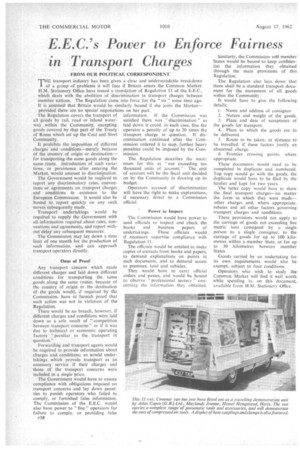E.E C.'s Power to Enforce Fairness in Transport Charges
Page 48

If you've noticed an error in this article please click here to report it so we can fix it.
• • FROM OUR POLITICAL CORRESPONDENT
THE transport industry has been given a clear and understandable breakdown 1 of a group of problems it will face if Britain enters the Common Market. JIM. Stationery Office have issued a translation of Regulation 11 of the E.E.C.,
which deals with the abolition of discrimination in transport charges between member nations. The Regulation came into force for the " six " some time ago.
• It is assumed that Britain would be similarly bound if she joins the Market— provided there are no special negotiations on her part.
The Regulation covers the transport of all goods by rail, road or inland waterway within the Community, excepting goods covered by that part of the Treaty of-Rome which set up the Coal and Steel
Community. • It prohibits the imposition of different charges and conditions—merely because of the country of origin or destination-for transporting the same goods along the same route. Introduction of such variations, or persistence after entering the Market, would amount to discrimination. The Government would be required to report any discriminatory rates, conventions or agreements on transport charges and conditions in existence to the European Commission. It would also be bound to report quickly on any such move's subsequently made.
Transport undertakings would be required to supply theGovernment with all information required about rates, conventions and agreements, and report without delay any subsequent measures, The Commission may lay down a time limit of one month for the production of such information, and can approach transport operators directly.
Onus of Proof Any transport concern which made different charges and laid down different conditions for transporting the• same goods along the same routes, because of the country of origin or the destination of the goods would, if required by the Commission, have to furnish proof that such action was not in violation of the Regulation.
There would be no breach, however, if different charges and conditions were laid down as a sole result of "competition between transport concerns" or if it was due to technical or economic operating factors "peculiar to the transport in question."
Forwarding and transport agents would be required to provide information about charges and conditions; so would undertakings which provide transport as an accessory service if their charges and those of the transport concerns were included in a single price.
The Government would have to ensure compliance with obligations imposed on transport concerns and lay down penalties to punish operators who failed to comply, or furnished false information. The Commission of the E.E.C. would also have power to fine" operators for failure to comply, or providing false cl 8 information. If the Commission was satisfied there was " discrimination " as laid down it could, in each case, fine the operator a penalty of up to 20 times' the transport charge in question. If discrimination continued after the Commission ordered it to stop, further heavy penalties could be imposed by the Commission_ The Regulation describes the maximum for this as "not exceeding ten thousand units of account." The unit of account will be the fiscal unit decided on by the Community in drawing up its budget.
Operators accused of discrimination will have the right to make explanations, if necessary direct to a Commission official.
` Power to Inspect
The Commission would have power to send officials to inspect and check the books and business papers of undertakings. These officials would if necessary supervise compliance with Regulation 11.
The ofkials would be entitled to make copies of extracts from books and papers, to demand explanations on points in such documents, and to demand access to premises, land and vehicles.
They would have to carry official orders and passes, and would be bound to observe 'professional secrecy " concerning the information they obtained. Similarly, the Commission ant member States would be bound to keep confidential the information they obtained through the main provisions of this Regulation.
The Regulation also lays down that there shall be a standard transport document for the movement of all goods within the Community.
It would have to give the following details: 1. Name and address of consignor.
2. Nature and weight of the goods.
3. Place and date of acceptance of the goods for transport.
4. Place to which the goods are to be delivered.
5. Route to be taken, or distance to be travelled, if these factors justify an abnormal charge.
6. Frontier -crossing points, where appropriate.
These documents would need to be completed in duplicate and numbered. Top copy would go with the goods, the duplicate would have to be filed by the haulier and kept for two years.
The latter copy would have to show the final transport charges—no matter the form in which they were made— other charges and, where appropriate, rebates and all other, factors governing transport charges and conditions.
These provisions would not apply to the carriage of goods not exceeding five metric tons consigned by a single person to a single consignee; to the carriage of goods for up to 100 kilometres within a member State, or for up to 30 kilometres between member States.
Goods carried by an undertaking for its own requirements would also be exempt, subject to four conditions.
Operators who wish to study the Common Market will find it well worth while spending Is. on this document, available from H.M. Stationery Office..












































































































